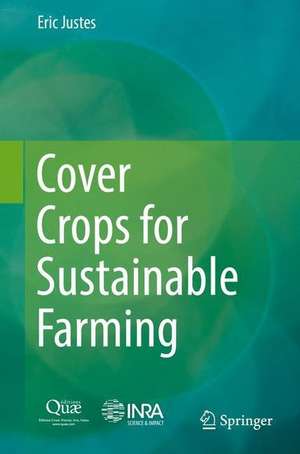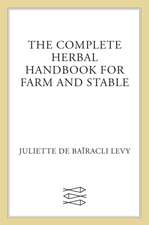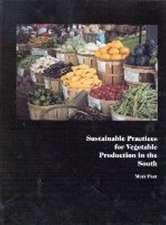Cover Crops for Sustainable Farming
Editat de Eric Justesen Limba Engleză Hardback – 7 iun 2017
| Toate formatele și edițiile | Preț | Express |
|---|---|---|
| Paperback (1) | 772.47 lei 6-8 săpt. | |
| SPRINGER NETHERLANDS – 15 aug 2018 | 772.47 lei 6-8 săpt. | |
| Hardback (1) | 778.32 lei 6-8 săpt. | |
| SPRINGER NETHERLANDS – 7 iun 2017 | 778.32 lei 6-8 săpt. |
Preț: 778.32 lei
Preț vechi: 949.17 lei
-18% Nou
Puncte Express: 1167
Preț estimativ în valută:
148.94€ • 159.26$ • 124.18£
148.94€ • 159.26$ • 124.18£
Carte tipărită la comandă
Livrare economică 18 aprilie-02 mai
Preluare comenzi: 021 569.72.76
Specificații
ISBN-13: 9789402409857
ISBN-10: 9402409858
Pagini: 92
Ilustrații: XIII, 95 p. 29 illus., 26 illus. in color.
Dimensiuni: 155 x 235 mm
Greutate: 0.34 kg
Ediția:1st ed. 2017
Editura: SPRINGER NETHERLANDS
Colecția Springer
Locul publicării:Dordrecht, Netherlands
ISBN-10: 9402409858
Pagini: 92
Ilustrații: XIII, 95 p. 29 illus., 26 illus. in color.
Dimensiuni: 155 x 235 mm
Greutate: 0.34 kg
Ediția:1st ed. 2017
Editura: SPRINGER NETHERLANDS
Colecția Springer
Locul publicării:Dordrecht, Netherlands
Cuprins
Foreword.- 1. Study context and methodology.- 1.1. Fallow period: definition, management practices and regulatory aspects.- 1.2. Study objectives and approach.- 2. Main lessons drawn from the study of the literature.- 2.1. Cover crop management techniques.- 2.2. Nitrate and water during fallow periods.- 2.3. Effects of cover crops on erosion, physical soil properties and carbon balance.- 2.4. Biotic effects of cover crops on weeds, microflora and fauna.- 2.5. Conclusion: a rich but incomplete analysis of the literature.- 3. Main lessons drawn from the simulation study.- 3.1. Objectives of the simulation study using a dynamic crop model.- 3.2. Methodology of the three parts of the simulation study.- 3.3. Generic and specific lessons drawn from the simulation study.- 3.4. Discussion of study results.- 4. Conclusions and outlook.
Textul de pe ultima copertă
This study, based on a literature review and simulations, shows the efficiency of cover crops at catching nitrate in most situations. It also analyzes both the negative impacts they can have and the ecosystem services they can provide: soil protection against water erosion, carbon sequestration in soils, impact on greenhouse gas emissions, contribution to weeds, pests and diseases control, etc.
The introduction of a cover crop between two main crops helps catch the soil mineral nitrogen before the period of drainage and consequently reduces nitrate leaching and nitrate concentration in the drainage water. This study allows quantifying the efficiency of cover crops at catching nitrate and optimizing their implantation conditions over a large range of French agronomic conditions.
More precisely, the study shows that cover crops are really effective to reduce nitrate concentration only if the fertilization of the previous crop has been properly fitted to theneeds, in order to minimize the residual amount of nitrate in the soil. Even in this case, cover crops are always useful, because mineralization of organic matter continuously feeds/fills the mineral nitrogen pool of the soil.
The presence of high nitrate levels in surface and ground waters, is a double challenge for public health and environment protection.
The study has been carried out by INRA at the request of the French Ministry of Ecology, Sustainable Development and Energy and the French Ministry of Agriculture, Agrifood and Forest in preparation of the 5th French action program "European Nitrate Directive". A multidisciplinary group of academics has been mobilized for this, including 16 researchers (soil science, agronomy, crop protection, law ...) from different public research institutions, assisted by experts from technical institutes and extension agencies.
Caracteristici
There is no similar book studying precisely the role of cover crops in leaching nitrate in such a large range of agronomic conditions The book shows how a multidisciplinary approach can succeed in describing the multiple ecosystem services provided by a single practice, i.e. setting up cover crops The study is a clear example of how a simulation approach can address a complex problem and help policymakers decision









